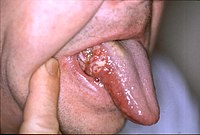
Photo from wikipedia
Combined treatment is a promising anticancer strategy for improving antiproliferation compared with a single treatment but is limited by adverse side effects on normal cells. Fucoidan (FN), a brown-algae-derived polysaccharide… Click to show full abstract
Combined treatment is a promising anticancer strategy for improving antiproliferation compared with a single treatment but is limited by adverse side effects on normal cells. Fucoidan (FN), a brown-algae-derived polysaccharide safe food ingredient, exhibits preferential function for antiproliferation to oral cancer but not normal cells. Utilizing the preferential antiproliferation, the impacts of FN in regulating ultraviolet C (UVC) irradiation were assessed in oral cancer cells. A combined treatment (UVC/FN) reduced cell viability of oral cancer cells (Ca9-22 and CAL 27) more than single treatments (FN or UVC), i.e., 53.7%/54.6% vs. 71.2%/91.6%, and 89.2%/79.4%, respectively, while the cell viability of UVC/FN treating on non-malignant oral (S–G) was higher than oral cancer cells, ranging from 106.0 to 108.5%. Mechanistically, UVC/FN preferentially generated higher subG1 accumulation and apoptosis-related inductions (annexin V, caspases 3, 8, and 9) in oral cancer cells than single treatments. UVC/FN preferentially generated higher oxidative stress than single treatments, as evidenced by flow cytometry-detecting reactive oxygen species, mitochondrial superoxide, and glutathione. Moreover, UVC/FN preferentially caused more DNA damage (γH2AX and 8-hydroxy-2’-deoxyguanosine) in oral cancer cells than in single treatments. N-acetylcysteine pretreatment validated the oxidative stress effects in these UVC/FN-induced changes. Taken together, FN effectively enhances UVC-triggered antiproliferation to oral cancer cells. UVC/FN provides a promising potential for preferential and synergistic antiproliferation in antioral cancer therapy.
Journal Title: Antioxidants
Year Published: 2022
Link to full text (if available)
Share on Social Media: Sign Up to like & get
recommendations!